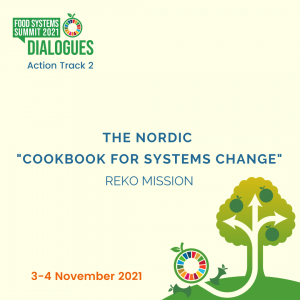Type de Concertation
Coordonnateur
Langue de l'événement de Concertation
Date/heure
À:
Cible géographique
Format
Veuillez consulter les détails ci-dessous pour obtenir des renseignements sur l’inscription, s’ils sont disponibles, ou communiquer avec le coordonnateur si vous souhaitez y assister.
Animateur
Description
Small businesses and smallholder farms are very important to food security, and increasing agricultural productivity is closely linked to reducing rural poverty and hunger. Yet, food continues to be lost and wasted. There is an urgent need for governments to make food loss and waste part of national climate strategies. These involve more public and private investments in transformation, stronger partnerships, training for smallholder farmers, technology and innovation to step up the fight against food loss and waste. There are many different innovative ways to tackle the challenges of food loss and waste – many of which we will discuss during this event.
How can we use the Nordic “Cookbook for Systems Change” as a strategic tool for a REKO mission project in the Baltics; to support small farmers, reduce food waste and increase sustainable food consumption?
What is the Cookbook for system change?
The Nordics have been involved in this effort of systemic change since they created the Nordic Food Manifesto.
The book provides the ingredients – templates for developing interventions, guides for how to get started and examples of cross-cutting projects – that can be used to create recipes for change. It also offers a new, emergent way to work with complex and dynamic systems.
What is REKO?
REKO is a Nordic model for selling and buying local food directly from producers to consumers. It was invented by Finnish farmer Thomas Snellman, who was looking for a better outlet than grocery stores for his wares.
REKO-projects can be much more than just “make a living for the farmers”. It’s an opportunity to make a difference and to make a lasting positive impact on communities and the environment.
The overarching goal of the REKO-project is to create sustainable food systems that benefit everyone equally, not just the consumers and stakeholders. It also involves giving local people a living wage while helping them to preserve their communities and culture.
The action here is also to include a mapping of food waste, landfills, and other challenges that will impact the goal of reducing food waste.
PROGRAM
Day 1. To be able to provide the participants with a background and understanding of our Independent Dialogue topic, we’ll have two Talks (panels) between three speakers and a moderator discussing the “Challenge” from two different perspectives.
▶ Talk 1 – ”Community Engagers”
3rd of November, 10:00-11:00 CET
Curator:
Dr. Diane Kapgen, Postdoctoral Researcher at University of Luxembourg
Talkers:
🔹 Chef Evaldas Žaliukas, Vice President of Aregala Lithuania, official director of “Volunteer Cooks Without Borders” Baltic Countries, Lithuania
🔹 Cyrille Gaubert, Business manager Stadsbruk Malmö – Development of urban food ecosystems, France
🔹 Rūta Lukošiūnaitė, Regenerative placemaker, Šilainiai urban gardens co-creator and co-founder of NGO « Kultūros dirbtuvė », Lithuania
Watch on Facebook or on YouTube.
▶ Talk 2 – ”Supportive Partners”
3rd of November, 14:00-15:00 CET
Curator:
Dr. Johanna Mendelson Forman, Distinguished Fellow at The Stimson Center & Honorary Nordic, US
Talkers:
🔸 Dr. Jolanta Blažaite, Chairperson of the Board of the Food Bank, Lithuania
🔸 Elīna Ozola, Head of Department of Rural Development at Latvian Rural Advisory and Training Centre, Latvia
🔸 Evelin Piirsalu, Researcher at Stockholm Environment Institute Tallinn Centre, Estonia
🔸 Olav Kjørven, Chief Strategy Officer at EAT Foundation, Norway
Watch on Facebook or on YouTube.
Day 2. What we’ll talk about….
This Independent Dialogue held in the follow-up to the UN Food Systems Summit, is a starting point for identifying challenges and opportunities within a collaborative “REKO” project with the Nordic and Baltic countries. It builds on a series of roundtable conversations.
🗨 UN Food Systems Summit Independent Dialogue session
4th of November, 14:00-16:00 CET
We invite you to take a seat at the table as a delegate and to bring an open mind, conscious curiosity, and diverse experience along with you.
The Dialogues approach enables participants to:
- Listen to each other;
- Welcome diverse perspectives;
- Seek out new connections;
- Explore both synergy and divergence;
- Collaborate in order to identify promising courses of action;
- Debate potential impact of different strategies.
By the end of the Dialogue period participants will have identified the practices and policies that will have the greatest impact on the achievement of the desired future vision within their local food systems. They will also consider how it will be possible to assess progress towards this vision as well as who needs to be involved in getting there and what kinds of challenges will need to be navigated along the way.
Remerciements


